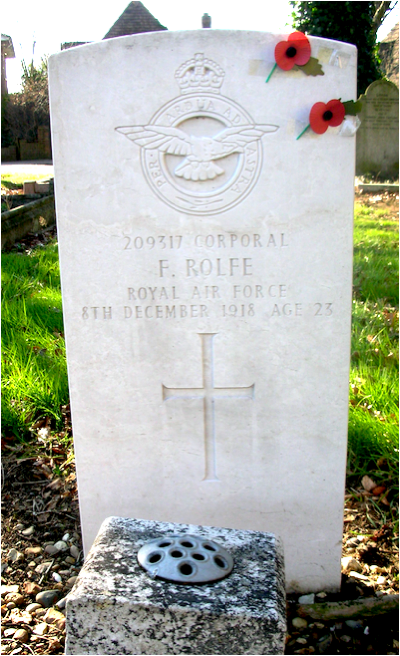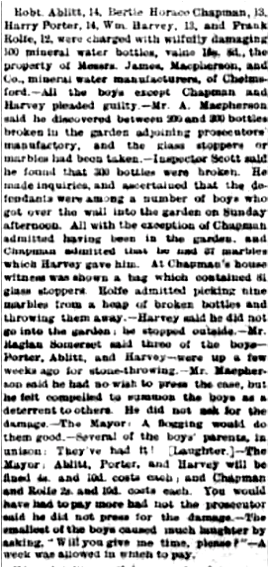Frank Rolfe was born and brought up in Springfield, one of nine children of a gas worker killed in an accident at Chelmsford Gas Works. He worked as a carpenter’s labourer then was employed at Marconi’s works in Chelmsford. He joined the Naval Air Service in 1915 and died in December 1918 from pneumonia from influenza, during the great pandemic that swept Europe at the end of the war. His home was in Tindal Street.
ROLFE, FRANK,
Corporal, Royal Air Force (formerly of the Naval Air Service)
able to have lifted the deceased by himself. If there had been any fumes he would have been affected. The Coroner: You thought it was possible that he was overcome fumes?—Not after bad hold him.
The witness added that there might have been a slight leakage in the chamber from broken nut, but he had not observed any, altnough he had turned the valves since the nut was broken.
A. Green and W. Sewell, gas stokers at the works, spoke of assisting in the removal of the deceased out of the pit, and to the absence of fumes or smells.
Mrs. White, wife of the foreman, said she put her hand on the deceased's breast and felt his heart beating very feebly while he was lying the ground.
Mr. J. L. Martin, surgeon, said that when he arrived he saw no breathing, and the deceased's heart had stopped beating. Witness started artificial respiration at once, and twice a little air or gas issued from the mouth, but there was no inspiration. The air that came from the mouth did not smell. A post-mortem examination showed that all the organs were healthy with the exception of the liver, which was enlarged. Witness came to the conclusion that death was due to asphyxia, because the blood vessels and sinuses of the brain were all very lull of nearly black liquid blood. The lungs were quite congested. The liver and kidneys were also full of blood, while the heart contained no blood, but was free from disease.
In reply to Mr. Bainbridge, witness said that poisonous fumes would cause asphyxia. Dir. J. Elsdaie Molson agreed with Mr. Martin's evidence.
Mr. E. Wm. Smith, the engineer and manager of the Gas Works, said the deceased was a fit and proper person to employ on the work in question. Witness had reason to believe that the whole of the sulphate apparatus, valves, and purifiers were in proper working order. The inspector for the district paid surprise visits several times a year. If there had been any defect of the valves the smell would have been strongly in evidence. An escape of fumes from the valves was possible, but it was most improbable in the present case. The pressure on the valves was very slight, and what little there was was relieved the moment the valve was opened.
In reply to the Coroner the jury said they were satisfied with the medical evidence, and did not wish adjournment for investigation of the plant.
The Coroner said there did not appear to anyone to blame. Every precaution was taken by the Company to see that their works were in order. He thought the only conclusion the jury could come to was that the deceased died from asphyxia, and that that it was accidental.
After considering in private the jury found that "the deceased died from accidental suffocation through the fumes arising from the valve chamber." The jury also passed a vote of condolence with the widow. Mr. Duffield said the directors heartily agreed with that.
In February 1908 Frank appeared before Chelmsford’s magistrates after committing a youthful indiscretion which was reported in a local newspaper report.

Frank was born on 12th October 1895 in Springfield, the son of gas worker George Rolfe and Annie Rolfe (nee Downing). His father had been born in 1852 in Chelmsford; his mother in 1861 in Southminster.
Frank was privately baptised at Holy Trinity Church in Springfield on 4th December 1895.
At the time of the 1891 census Frank’s parents and three siblings had been resident at Provident Square in Springfield. His father was a gas stoker.
Frank’s siblings, all Springfield-born, included John Rolfe (born on 1st December 1889 and christened at Holy Trinity Church in Springfield on 23rd January 1890), Arthur Rolfe (born in 1883), Willie Isaac Rolfe (born c1886), Frederick Reuben Rolfe (born in 1887), John Rolfe (born in 1890), Florence Louisa Rolfe (born in 1893), Charles Benjamin Rolfe (born on 15th October 1897, died in 1995), Reuben Rolfe (born in 1899), and Annie Louisa Rolfe (born on 20th August 1901 and christened at Holy Trinity Church in Springfield on 22nd September 1901).
The 1901 census found six year-old Frank living with his parents and
seven siblings at 2 Provident Square, Springfield. Frank’s father remained employed as a gas stoker at the nearby gas works. Frank’s brother Arthur was a stonemason’s labourer, brother William was a barge boy, and brother Fred was an errand boy. A neighbour at 2 Provident Square was six year-old Gordon Hedley Carlton who was also to lose his life in the War.
Later that year, on 9th November 1901 Frank’s father was killed in an industrial accident at Chelmsford Gas Works. The Essex County Chronicle reported:
“GAS WORKER'S SAD DEATH CHELMSFORD. LEAVES A WIDOW AND NINE CHILDREN.
On Saturday afternoon George Rolfe, of Navigation-road, Springfield, a worker employed at the Gas Works died suddenly while at work. He was engaged on a purifier, and while in a chamber where there are certain valves he suddenly fell. George White, the line man, happened to see the occurrence, and at once removed Rolfe from the pit, but the poor fellow was past recovery. Mr. J. L. Martin, surgeon, was called, but he could render no assistance. The deceased, who was 44 years of age, leaves a wife and nine children.
INQUEST AND VERDICT.
The inquest was held on Wednesday at the Gas Works, by Mr. J. L. Quenneil, the deputy coroner. Messrs. W. W. Duffield, F. Marriage, A. Durrant. and G. Baker, directors the Gas Company, and Mr. C. C. W. Hoare, a Board cf Trade Inspector, were also present.
The widow said her husband had employed the Gas Works for 15 or 16 years. He had been in good health.
George White, foreman at the works, stated that he saw the deceased standing the sulphate-house waiting for his last "charge " to come down into the saturator. Witness said, "How long before your last ‘fishing' will be ready?" and he replied, “Not long ; it's dropping nicely. I believe the purifier is throwing a little pressure." On finding that there was a hard substance at the bottom of the oxide in the tank, witness said they would "turn into the other purifier." The deceased then took up the gratings of the valve chamber to open the valve. While in the act of taking the T key off to enable him to further open the valve, he fell forward. Witness ran to the corner of the sulphate-house and shouted to Green and Sewell for help. Witness jumped into the pit, and was lifting the deceased out as the two men came to his assistance. The deceased fell with his head in the corner. Not more than minute elapsed from the time he fell to the time was taken from the pit. The body was laid in the yard, a doctor was sent for, and witness obtained some brandy, pouring into the deceased's mouth through his closed teeth. The deceased did not show any sign of life. The deceased had been engaged in sulphate making for about three weeks, and was an experienced gasworker. The valves were opened about every three days, but the deceased had only opened them once before, viz., on the previous Thursday. Witness had never found any danger in turning the valves, and had done it himself regularly for about eight years. He had never noticed anything in the chamber that required very great care. The valves were opened for the gases to pass from the sulphate plant to the purifiers. Witness did not smell anything while the deceased was in the pit, neither did he feel ill going into it to fetch the body. Nothing in the chamber had since been touched. He was not aware that any of the machinery was faulty, nor had he received any complaint.
In reply to questions by Mr. H. Bainbridge, a juror, witness said he had never found it dangerous work to go into the chamber. He did not go into the chamber directly because would not have been

Frank’s mother married Alfred Philpott in 1909. Alfred had been born in 1866 in Great Baddow.Two years later the 1911 census recorded 16 year-old Frank living with his mother and step-father and two siblings at 10 Union Yard in Chelmsford. Frank was a labourer for a carpenter, his step-father a furniture remover.
He subsequently worked as a carpenter at Marconi’s works in Chelmsford, before joining the Royal Naval Air Service (RNAS) on 20th November 1915 as a carpenter for the duration of the war. He became a Leading Mechanic with the RNAS and a Corporal Mechanic with the Royal Air Force following its creation on 1st April 1918.
Frank died from pneumonia on 8th December 1918 while serving as Corporal 209317 in the No.1 Store Depot (Kidbrooke) of the Royal Air Force. He was aged 23. He is buried at Springfield (Holy Trinity) Churchyard.
The Essex Weekly News of 20th December 1918 carried news of Frank’s death:
“Victim of pneumonia. - The funeral of Corpl. F. Rolfe, R.N.A.S., son of Mrs. A. Rolfe, of Tindal-st. tool place at Springfield Churchyard on Saturday, Rev. F. S. Paynter officiating. The deceased. who was 25 years of age, had been in the Naval Air Service since 1915, and before joining up was engaged at the Marconi Works, Chelmsford. He had been recently employed at the R.N.A.S. works at Wormwood Scrubs. and died in hospital at Woolwich from pneumonia following influenza. Three of his brothers are still serving in France, and another, Sergt. W. Rolfe, 1st Essex, recently returned from captivity in Germany. At the burial on Saturday the coffin was covered with a Union Jack, but there was no military ceremony. The chief mourners were: - Mrs, Rolfe, mother; Mr. A. Philpott, stepfather; Mr. and Mrs. A Rolfe; Mr.
and Mrs. W Rolfe, brothers and sisters-in-law; Messrs. C. and P. Rolfe, brothers; Mrs. Bond and Miss M. Rolfe, sisters; Mrs. Rochester, aunt; Mr. G. Rochester, cousin; and Mr. G. Rolfe, uncle. There were also present about twenty men of the Naval Air Service from Wormwood Scrubs and a number of employees from the Marconi Works.”
The day’s Essex County Chronicle reported:
“Six Soldier Brothers. Corpl. Frank Rolfe, R.N.A.S., one six brothers serving in the Forces, and well known in Chelmsford, died in hospital at Woolwich Dec. 9, and was buried at Holy Trinity Churchyard on Saturday with semi-military honours. Deceased was a son of the late Mr. Rolfe, an employee at the Gasworks, who lost his life some years ago in an explosion there. One brother, Sgt, W. Rolfe, Essex Regt., of 111 Mildmay Road, recently returned home after being a prisoner of war in Germany. Three brothers are still in France, and another is suffering from trench fever. Before joining up the deceased was a carpenter at the Marconi Works, and had been with the R.N.A.S. for three and a half years. He was 25 years of age and not married. The Rev. F. S. Paynter officiated at the funeral, which was largely attended.”
Frank is commemorated on the Civic Centre Memorial, Chelmsford.
The 1918 register of electors listed an absent Frank, his mother and stepfather at 10 Tindal Street, Chelmsford. Frank’s mother died in 1956, aged 94. His nephew, Frederick Albert Bond, lost his life in the Second World War.
140701